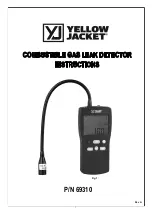
Thermo Scientific APEX User’s Guide
Page 309
Interference can be overcome by opening the conductive path with an insulating pad or
closing the path by welding or tightening the bolts so that it cannot become intermittent.
The source of such loop interference can be very elusive and difficult to locate. The
larger the aperture in the APEX, the greater the high-frequency leakage out of the
aperture and the greater the possibility of trouble from loops.
Metal Objects Near the Search Head
The metal detector is very efficiently screened and metal near the top, bottom, and ends
will not significantly affect the detector performance. However, metal positioned close to
the aperture can cause interference problems, if it moves or vibrates. The area close to
the aperture which should be kept metal free is known as the metal-free zone. This
metal-free zone is dependent upon the aperture dimensions and the sensitivity setting of
the detector.
The metal detector is sensitive to moving metal. It is not always possible to discriminate
if the metal is passing through the head or moving outside the head. Metal in the metal-
free zone may cause the detector to be sensitive to vibration.
If the APEX vibrates or is accidentally bumped, it will cause relative movement between
the detector and the offending metal, which could trigger the detector.
Electrical Interference
It is always good practice to suppress electrical interference at its source and, if trouble
is experienced, the offending source should be located and suppressed. If this is not
possible, it may be necessary to operate the APEX at a reduced sensitivity.
A relay in the metal detector is often used to control solenoid valves, power contractors,
and similar electrical devices. When these devices are switched off, the collapsing field of
the winding generates a wide-band interference, which may be picked up by the search
coils in the detector head and cause false triggering.
A capacitor of suitable capacity and working voltage connected across the offending
device and grounded as close to the device as possible, will often provide satisfactory
suppression.
Pneumatic Air
Connect incoming air to the detector’s air-regulator fittings using a coiled copper tube or
air hose. Adjust the incoming air pressure to 30–40 PSI (2.1–2.5 kg/cm
2
) for pneumatic
devices, or 40–80 PSI (2.8–5.6 kg/cm
2
) for air rejects.
The Next Step
Now that you have completed the electrical and mechanical set up for your pipeline
application, please go to the “Getting Started” section on page 11 to learn how to
operate your newly installed APEX detector.
Summary of Contents for APEX 100
Page 1: ...Thermo Scientific APEX Metal Detector User s Guide REC 4248 Rev K Part number 085381 English ...
Page 10: ...Page 10 Thermo Scientific APEX User s Guide ...
Page 78: ...Page 78 Thermo Scientific APEX User s Guide ...
Page 110: ...Page 110 Thermo Scientific APEX User s Guide ...
Page 258: ...Page 258 Thermo Scientific APEX User s Guide ...
Page 270: ...Page 270 Thermo Scientific APEX User s Guide ...
Page 282: ...Page 282 Thermo Scientific APEX User s Guide ...
Page 310: ...Page 310 Thermo Scientific APEX User s Guide ...
Page 319: ...Thermo Scientific APEX User s Guide Page 319 Appendix A Modbus Communications Card ...
Page 320: ...Page 320 Thermo Scientific APEX User s Guide ...
Page 324: ...Page 324 Thermo Scientific APEX User s Guide ...
Page 340: ...Page 340 Thermo Scientific APEX User s Guide ...
Page 367: ...Thermo Scientific APEX User s Guide Page 367 Appendix B IntelliTrack XR ...
Page 368: ...Page 368 Thermo Scientific APEX User s Guide ...
Page 402: ...Page 402 Thermo Scientific APEX User s Guide ...
Page 404: ...This page intentionally left blank ...
Page 414: ...This page intentionally left blank ...
Page 430: ......
Page 431: ......
Page 432: ......
Page 433: ......
Page 434: ......
Page 435: ......
Page 436: ......
Page 437: ......
Page 438: ......
Page 439: ......
Page 440: ......
Page 441: ......
Page 442: ......
















































